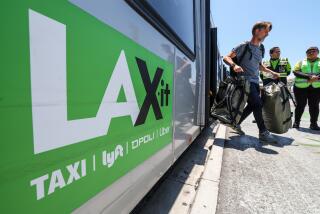Port to Strengthen Airport Taxi Rules : Commissioners Promise Fast Answers to Tourists’ Complaints About Chaos
- Share via
Responding to repeated complaints by visitors to San Diego, Port District commissioners Tuesday voted to tighten Lindbergh Field cab regulations to improve what one commissioner called the most chaotic taxi service of any airport in the country.
After a Mission Valley public hearing that was attended by about 50 cabdrivers and taxi company executives, the commissioners ordered the Port District’s attorney to draft a measure within 30 days. Commissioner Louis Wolfsheimer said the ordinance could be adopted within 45 days, after another hearing.
“Let’s bring some order to the chaos,” Wolfsheimer said.
Among the changes proposed by Wolfsheimer, who charged that cab service at Lindbergh is the worst at any airport in the country, were requirements that cabdrivers be able to speak and understand English and be “familiar with the region.”
Many of the drivers who attended the hearing were foreign-born and many expressed concern that the new proposal would reduce the number of drivers authorized to pick up airport fares. The San Diego Unified Port District oversees airport cab service and has issued 450 permits that allow drivers to work at the airport every other day.
Several drivers pointed out that there are usually 225 cabs at the airport on any given day vying for lucrative airport fares but only 63 taxi waiting spaces available. The large number of cabs parking--often illegally--around both terminals contributes to monumental traffic jams, particularly during holidays.
Earlier this year Port District Director Dan Nay called for a reduction in the number of cabs to 150, even though that number still would be too high, he said. On Tuesday, Wolfsheimer said that the commission staff has recommended cutting the number of cabs to 100 daily, but he complained that commissioners “have never had the intestinal fortitude” to follow the staff’s recommendation.
Although the port commissioners agreed that the number of cabs must be reduced in order to make airport taxi service more efficient, the commissioners did not spell out how the reduction is to be accomplished. Instead, they will await recommendations from the staff and the Port District’s attorney.
One possibility that was discussed is the holding of another lottery to issue new, and fewer, airport stickers. However, that was met with universal opposition by the drivers at the hearing.
In addition to a possible reduction in the number of cabs, Wolfsheimer said, the proposed ordinance should also regulate the age and condition of the cabs, require all airport cabs to be the same color and enforce a dress code for drivers.
Since the city deregulated the taxi business about six years ago, the number of cabs in San Diego mushroomed from 410 in 1979 to the present 903. Deregulation also meant that cab companies were allowed to set their own rates below the maximum established by the city.
The end result has been a dizzying array of fares at the airport. The fare paid by airport riders depends on the cab they take, and ranges from a low of $1.05 for the flag drop and $1.40 a mile to the maximum fare allowed by law--$1.40 for the flag drop and $1.66 per mile.
Tuesday’s hearing stemmed from numerous gripes received by port authorities from visitors who complain about everything from price-gouging to rude and sloppily dressed drivers, and reckless driving.
Several drivers at the hearing asked the commissioners to standardize airport fares, but Commissioner Phil Creaser said the Port District is not authorized to set rates, which are determined by the City Council.
While most commissioners and drivers agreed that the cab problem at the airport stems from having too many cabs there, some drivers disagreed.
Mohammed N. Karimi, an owner-operator affiliated with Orange Cab Co-op, blamed limousines, jitneys and hotel airport shuttles for taking business away from taxi companies and contributing to the long line of cabs that wait for fares at Lindbergh Field.
Some foreign-born drivers reacted angrily to charges by other drivers and some commissioners that some immigrants who go into the business cannot speak or understand English.
“As you can see, I am among those people who have accents. But I speak seven languages, and each one with an accent,” S.H. Mirzad, an Afghan refugee, told the commission. Mirzad said that he has a Ph.D. in engineering from the University of Paris and went into the cab business only after he could not find a job in his field.
More to Read
Sign up for Essential California
The most important California stories and recommendations in your inbox every morning.
You may occasionally receive promotional content from the Los Angeles Times.













